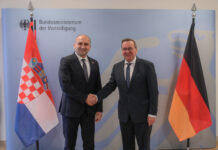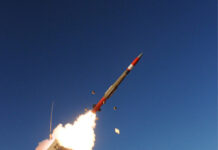Senior officials from Lockheed Martin’s Missiles and Fire Control (MFC) division stressed the importance of the company’s European partnerships – in particular those with Poland and Germany – in an online briefing to journalists on 8 June 2023.
“For more than 70 years we’ve been a trusted partner to NATO and our European allies,” said MFC Vice President Brenda Davidson. “Today’s security situation requires technology and programmes that allow allies to work as one force and stay ahead of our growing threats. To meet customer requirements and strengthen our international partnerships we work closely with European countries to deliver our advanced defence solutions in a way that works for the countries’ current and future military needs and with their timelines.
“For example, in Poland we work closely with five Polish companies to support the Wisła offset programme and strengthen Poland’s national defence capabilities,” said Davidson. Under the Wisła programme, signed off in 2018, Poland is procuring eight batteries of the US Patriot air and missile defence system, with Lockheed Martin providing its PAC-3 Missile Segment Enhancement (MSE) missiles for the system. Establishing a production line for key missile launch assemblies at Polish aerospace company WZL1 is one of 15 projects that Lockheed Martin implemented with Polish industry to fulfil its Wisła-related offset obligations.
“Out of our 15 offset projects, three have already officially been closed by the Polish [Ministry of National Defence] and four are currently going through the close-out process,” noted Davidson. “We are committed to building the deterrence capability of the Polish armed forces and the growth of the domestic industrial base.
“In addition to Poland, we’re also working very closely with the German government to meet their customer-specific requirements,” Davidson continued. “Recently [on 11 May] we had a successful flight test to validate the compatibility between the PAC-3 MSE in the German modified Patriot M903 launcher. That test paved the way for the first delivery of PAC-3 MSE to Germany later this year.”
Lockheed Martin’s High-Mobility Artillery Rocket System (HIMARS) is also at the centre of additional partnerships with Poland and Germany. While in mid-May Poland received the first HIMARS launchers of 20 systems ordered in 2019, this is likely to just be the beginning of Lockheed Martin’s HIMARS relationship with Poland.
“One of the partnerships we’re currently exploring includes a partnership with Poland’s Homar-A programme,” said MFC Vice President Paula Hartley. “The armaments agency of the [Polish] Ministry of National Defence is expected to invite Lockheed Martin to negotiate a framework agreement for the Homar-A programme. Under this agreement we, alongside Polish industry, will integrate key components of the HIMARS rocket launcher onto their Jelcz 6×6 truck. The negotiations will also include discussion around Polish production of munitions. The development of industrial partnerships under the Homar-A initiative marks yet another major step in our engagement to strengthen Poland’s economic growth and security through partnerships with local industries.

“We’re also looking at options in Poland and in Australia to provide ongoing support, maintenance and sustainment of the HIMARS and its related equipment in country,” Hartley added. “Providing defence with technical and logistical support and sustainment services offers opportunities for local small to medium enterprises and provides local employment opportunities and benefits for those economies.”
“Another specific activity we’ve been engaged in is with Rheinmetall in Germany,” Hartley noted. “I had the pleasure to represent Lockheed Martin [in April 2023] as we entered into a memorandum of understanding [MoU] to collaborate with Rheinmetall Defence on tailored solutions to provide Germany with the unique rocket artillery system that maximises existing and combat-proven components produced in Germany.”
Noting that its HIMARS and M270 Multiple Launch Rocket System (MLRS) are the only available platforms that will fire Lockheed Martin’s next-generation munitions such as Extended-Range Guided MLRS and Precision Strike Missile (PrSM) rounds, and that other systems cannot fire the company’s current guided or future munitions, Hartley said that “under the collaboration with Rheinmetall we’ll explore potential joint opportunities and areas of research and development, production and other activities.
“The MoU was an agreement of strategic significance and an opportunity to secure key technologies and a significant share in the value-add supply chain for Germany,” Hartley added. “This is yet another step in our partnership with Rheinmetall, bringing 21st Century security solutions to Germany.
“These partnerships that I just mentioned with Poland and Germany are so important,” concluded Hartley, “especially when considering support to our NATO allies.”
Peter Felstead













